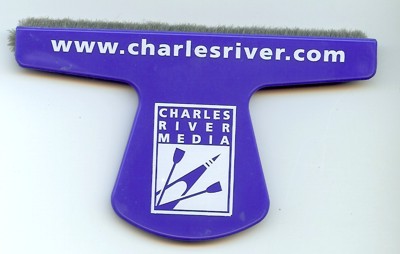
It's a small (the blade is four inches wide) brush for cleaning monitors. It does work, although it's not as effective on LCD monitors as on CRT monitors because the glass isn't all that thick and you can't therefore press all that hard.
Charles River Media is (or rather was — it's been bought out) a publishing house specialising in non-fiction computer books. I have some of the books they put out in the games area; they're not bad.
Anyway, the reason I'm bringing this up is the name: Charles River.
To British eyes, the question that immediately springs to mind is "who is Charles River?".
However, it was only last year that I discovered that Charles River does not, in fact, refer to a person: it refers to a river — a very particular river that runs through Boston, Massachusetts. Its course takes it past Harvard University, MIT, Brandeis University and Boston University. To American eyes, it therefore has vague connotations with very high-status academic establishments; hence, Charles River Media is a name intended to convey a sense of quality.
The reason that "Charles River" looks like a name to people in Britain is in part because it starts with a common forename, but also because the "River" comes second. They don't do that here. We put our River part first. River Thames, River Trent, River Severn, River Ouse, ... We use it as an adjective to modify the name, which is a noun. In North America, they use the name as an adjective and the River part as the noun: Mississippi River, Colorado River, Columbia River, Ohio River, ... About the only one they don't do it with is the Rio Grande.
We can hardly accuse Americans and Canadians of being wrong, though, because we do the opposite with lakes. Most of our lakes, lochs and loughs have the "Lake" part first. When they don't, it's either because it's embedded in the name as -mere or -water, or it's a reservoir. There are some smaller lakes with names the other way round, but the big ones all have Lake first. It's the same story in North America: all the Great Lakes have Lake first, and so do most others.
I recall, many many years ago, reading an article that said the difference in approaches was something to do with the influence of the French in naming geographical features in North America. I've no idea why that would be so, though. Yes, they always put "Lac" first for lakes, but then they generally put adjectives after nouns. I'm not entirely sure whether they ever even use "Rivière" as part of river names.
Oh well. Whatever the explanation, I guess at least now I know why River is more popular as a baby name in the USA than it is in the UK.